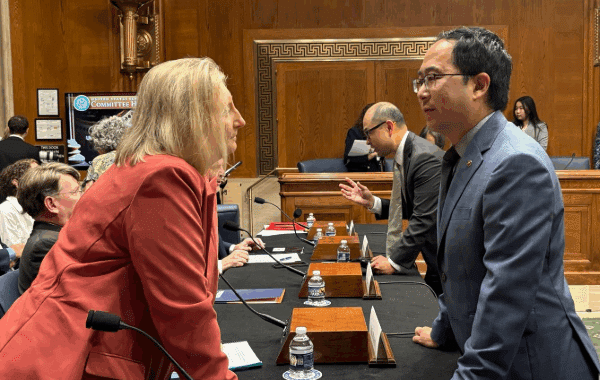It was a national opportunity to show how New Jersey is taking its regulatory efforts way too far to reduce independent contractor work in the Garden State.
And Fight for Freelancers’ co-founder and New Jersey resident Kim Kavin took full advantage of it.
The Senate Committee on Health, Education, Labor, and Pensions (HELP) held a hearing in Washington, D.C. on Thursday focused on a package of bills intended to help independent contractors with everything from simplifying classification policy to benefits and retirement plans access.
Committee chair Senator Bill Cassidy, R-Louisiana, and Ranking Member Bernie Sanders, I-Vermont, hosted the session to explore ways to modernize federal labor laws to better support gig workers, freelancers and other nontraditional earners who typically lack access to employer-provided benefits like health insurance, retirement savings and paid leave.
But Kavin made it priority to explain how the New Jersey Department of Labor is putting independent contractors “under attack” with a replication of an ill-fated California law that attempts to greatly change the number of gig workers who would be classified as employees, according to Kavin.
“Right now, the state of New Jersey is trying to create (the California independent contractor rule AB-5 on steroids,” Kavin told the committee.
“Attorneys say this proposed rule almost entirely eviscerates any chance of being an independent contractor while the state itself says the rule won't create a single job.
“This is not targeting employee misclassification. This is weaponizing regulatory language to attack independent contractors.”
CALIFORNIA SCREAMING
NJBIA’s Elissa Frank and many others from the business side and independent worker side have said NJDOL is extending beyond legal overreach with its proposed rule that would classify more gig workers as regular company employees by drastically changing the conditions of the “ABC test” to determine a gig worker versus an employee.
Frank and Kavin spoke of the grave concerns of both the gig worker and employer community of the proposed changes on NJBIA’s Minding Your Business last weekend.
The California rule, AB-5, has resulted in an 81% reduction in job creation and a 10.5% reduction in self-employment, Kavin said. She also said union membership actually went down as a result of the rule in the Golden State.
“AB-5 is such a disaster that Governor Gavin Newsom's former deputy chief of staff said it's truly horrific how many people are negatively impacted by it,” she testified. “The Trump administration's deputy U.S. labor secretary called it catastrophic.
“Members of the California Advisory Committee to the U.S. Commission on Civil Rights warned that it disproportionately and negatively affects women, immigrants, people of color, and the politically powerless. And a California assemblyman is asking the U.S. Department of Justice to investigate.
“It's just bad policy,” Kavin said.
MENDS WITH BENEFITS?
Earlier this month, Cassidy and Senator Tim Scott (R-South Carolina) introduced a legislative package that aims to provide certain portable benefits to workers classified as independent contractors.
The term “portable benefits” is something of an umbrella term for various benefit programs that follow workers from job to job, rather than being tied to a specific employer.
While it remains to be seen how much this legislation would help the cause of independent contractors, both Kavin and Patrice Onwuka, director of the Independent Workers Forum’s Center for Economic Opportunity told the committee that its first priority should be to put an immediate stop to efforts like the ones in California and New Jersey to halt independent contractor work.
“Flexible work through independent contracting is critical to women's labor force attachment,” Onwuka told the committee. “Independent workers value the ability to work for whom they want, when, where, and how they choose.
“But Congress can overcome some of these challenges by avoiding mass reclassification of workers through stringent employment tests and, instead, harmonizing the independent contractor definition across federal agencies with a clear and simple test.”
SENATOR KIM WEIGHS IN
New Jersey Senator Andy Kim, who also sits on the HELP Committee, very candidly spoke about the declining health of his father and how he was unable to afford retirement in his later years.
He asked Kavin if she could support automatic-enrollment IRA programs for freelancers and independent contractors.
It was a compelling exchange that suggested further conversations would be had.
Kim: “Is (an auto-enrollment IRA program) something you'd see some value in?
Kavin: “I think the first thing we have to do is protect our freedom to actually be independent contractors. That is under attack both at the federal level and very much right now in our home state.”
Kim: “Understand that. I take your point. I want to make sure people have flexibility. I want to make sure that they can be able to live the lives that that they want to live. And we will take that on here and have some tough conversations. But still, I'm just trying to think pragmatically. Is that at least something that you'd be open to exploring and seeing how that type of tool at the state level might be utilized?
Kavin: “I'm happy to meet with you and talk with you about anything you'd like. And I do feel for you with your dad. We're going through something similar. I had an aunt who just took a bad fall. She's a retired nurse who spent a few days in the ER. She was incredibly impressed with the traveling nurses, the independent contractors who helped her get better and get home. So, again, what I say first and foremost is before we delve into all these specifics on other types of things, we need to protect the freedom for all of us to actually be independent contractors and earn a living.”
Kim: “Yeah, my mom was one of those nurses that worked at a hospital that then wanted to be able to have some more freedom, you know, to be able to do home visits and other things of that nature and try to find different arrangements. So, look, I see how that benefited her, allowed her to be the kind of mom she wanted to be. So let's continue to try to work together here and see what we can get done.”




